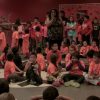KJIPUKTUK (Halifax) – Here in Nova Scotia, the Commission on Inclusive Education released its final report, “Students First” last March. While it’s not perfect, it’s certainly very well-done, and the commission definitely consulted with the relevant stakeholders. For the most part.
However, it’s blatantly obvious that the government is dragging its feet on implementing the recommendations of the inclusion report.
In no small part this is because they’ve been excitedly focused on implementing the recommendations of the exceedingly flawed Glaze report “Raising the Bar“. (See Grant Frost’s thoughtful commentary for everything wrong with the Glaze report. He’s written extensively about this on his blog frostededucation.com)
I could go on about all the various recommendations in each report, but I’ll let you read them yourself.
Today I want to discuss something that I think is getting lost in all this.
When it comes to inclusive education, it is a well-known fact that EPAs and other school support staff do not have anything close to adequate training to provide support for autistic kids.
I couldn’t agree more.
But there’s an idea that I’m not sure a lot of school support staff have considered much. Certainly not our government.
And that is…..
…..Why not listen to actually autistic people?
Radical concept, I know!
And I don’t just mean listening to the personal anecdotes of numerous autistic activists who’ve been writing for years. There are training modules developed by actually autistic people that could give EPAs and support workers a whole new perspective.
I’ve written about one such module before. And I will continue to promote it relentlessly.
I am referring to.Foundations for Divergent Minds. You can check them out at www.divergentminds.org
I actually wrote to the Education Minister, Zach Churchill, before Christmas, to tell him about it. Ordinarily, I’d write to the local school board, but that simply isn’t possible.
You see, one of the recommendations of the Glaze Report was that school boards be abolished, and they very quickly were. They’ve been replaced by “regional education centres” which are fully beholden to the minister’s whims. So writing to the minister was the only option.
And do you think I got a response?
I’ll let you figure that out.
FDM is, in my very educated opinion, the best resource for EPAs, respite workers, and everyone who provides support to autistic and other neurodivergent children.
They also have training courses available, which are very affordable. Payment plans and scholarships are available, as are customized training packages.
Another useful training course is “AAC Coaching for Parents and Caregivers”, taught by Artful Expressions Speech Therapy and Voice Training. This is not created by autistic people, but Artful Expressions is one of the best SLP places I’ve ever come across. Find it here: https://artful-expressions-center-for-communication.teachab…
The point is, EPAs have excellent resources, created by the real experts on autism, to support autistic students. They just have to look for them. As does our government.
Most importantly, they need to be willing to listen to autistic people. Because as I, and many of my fellow activists have repeatedly said, we are the real experts.
Thankfully, there are a few MLAs who seem to be willing to listen. I’ve met with a few.
I’ll leave the last word to Cynthia Bruce, an instructor at Acadia University and disability rights activist:
“In 2019, @nseducation must commit to serious consultation with#DisabledScholars who have lived and professional expertise to help us map a path to #RealInclusion in Nova Scotia schools.#NothingAboutUsWithoutUs means listening to and acting on our knowledge about inclusion.”
See also: For autistic children government programs aren’t the only option
With a special thanks to our generous donors who make publication of the Nova Scotia Advocate possible.
Subscribe to the Nova Scotia Advocate weekly digest and never miss an article again.




Please be mindful of person- first language. Children with Autism Not Autistic children- they are always kids first.
By and large the Autistic community has said that they prefer identity first language.
I invite you to read this study: https://journals.sagepub.com/doi/abs/10.1177/1362361315588200
This study also found similar numbers, but it is not a part of the main findings: https://www.ncbi.nlm.nih.gov/m/pubmed/22545843/
You can also read the Autistic Self Advocacy Network’s statement here: https://autisticadvocacy.org/about-asan/identity-first-language/
And a lead researcher’s analysis here: https://www.ncbi.nlm.nih.gov/pmc/articles/PMC5545113/
We should be long past labelling people but it’s an uphill battle when the very people who are being referred to in a demeaning manner are using these terms themselves. I am frequently asking people not to say wheelchair bound, confined to a wheelchair, handicapped, disabled person/child/community, etc. Most online articles contain these terms despite a quick web search, “confined to wheelchair derogatory” producing hundreds of results explaining why we should use first-person language. In the United States, handicapped is considered perfectly acceptable. I’ve called up businesses to ask that they change their “handicapped parking” signs to “accessible parking.” People are resistant to changing labels when they are wearing it like a badge of honor. Labelling oneself as disabled, autistic, paraplegic, etc. may mean that the person or the child’s parents want attention or sympathy.
I am curious where “person first language” came from. My son and many of his friends are Autistic and they find person first language condescending and offensive. They ask to just be called Autistics or Aspies.
It is presumptive to think that those who describe themselves (or their loved ones) as disabled, autistic, paraplegic, etc., are demeaning themselves or looking for attention or sympathy. If an autistic person prefers to describe themselves as autistic vs person with autism, then we should respect their preference.
I said, “may mean”, not does mean. As you say, if people wish to identify themselves as a disability, disorder, impairment, instead of a person with one, that is their choice. We, however, need to stop doing this, as a first step to inclusion. This article is about the inclusion of persons with autism. If we saw them as people who just happen to have autism, we wouldn’t still be having this issue in 2019. The language we use to describe a marginalized segment of the population has an enormous impact on how we treat them. History proves this. How can we get anywhere with inclusion of people with disabilities if we always label them as disabled, autistic, etc.? When the public is constantly hearing the phrases, “disabled person”, “amputee”, “autistic”, etc., that’s all they hear. My comment and Robyn’s comment are about how we label them not how they label themselves. Is it okay to call a person of African descent the N word because some of them call themselves this? I was simply speculating as to the motive of someone who deliberately emphasizes something that separates them from the general population. For example, look into why some people with hearing loss are against cochlear implants. Some people with disabilities do want special treatment (I’ve seen it). As a wheelchair user, I don’t refer to myself as a disabled person because I’m not a broken machine or a defunct computer program. I’m a human being. My using a wheelchair for transportation, like others use cars and bicycles, is irrelevant to my identity.